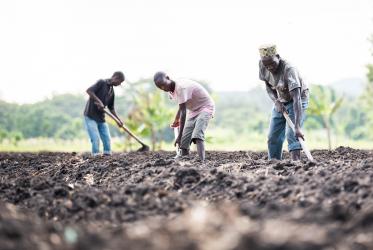*By Fredrick Nzwili
As the UN warns that the coronavirus pandemic is pushing millions to the brink if starvation in a “widespread famine of biblical proportions,” a senior Christian leader in Africa has emphasised that it is possible to beat hunger, a yoke that enslaves many in the continent.
Rev. Nicta Lubaale, the general secretary of the Organization of African Instituted Churches said hunger had become a big issue given the recent global data of the hungry and the failure to meet the Sustainable Development Goals on Zero Hunger.
“The number of people going hungry in the world is going up again. Africa, especially sub-Saharan Africa is the most-hungry… as over 20 percent of the population is undernourished. The coming of any crisis would worsen the hunger,” said Lubaale.
The leader’s comments echo those of David Beasley, the executive director of the UN World Food Programme who told the UN Security Council on 21 April that while dealing with the COVID-19 pandemic, the world was also on the brink of a hunger pandemic.
“Millions of civilians living in conflict-scarred nations, including many women and children, face being pushed to the brink of starvation, with the spectre of famine a very real and dangerous possibility,” said Beasley.
But Lubaale said it was possible to turn things around if leaders stopped tackling hunger as a shame of the poor.
“It is a shame on us leaders. Second, we have to refuse to live with the scandal of poverty in the midst of plenty,” said the leader, while adding that COVID-19 had emerged when some African nations were trying to comprehensively address existing challenges related to food security, including climate change, locusts and army worms.
According to Lubaale, the Organization of African Instituted Churches has been pushing for the integration of agriculture in the interventions against the virus.
At the same time, he feared in COVID-19 response, the world was repeating the same mistakes made in the initial responses to HIV.
“We left out the aspect of food only to realise later that it was very critical-people living with HIV and AIDS needed to be food secure to live positively and to be able to comply with the treatment regimes,” said the leader.
“We want to ensure that agriculture is not forgotten. We continue to engage the churches to make sure it is part of their response.”
In a congregation-based approach, the organization is working with farmers in local churches to improve farm yields, manage seeds and increase agricultural investments.
Community seed banks, which ensure an uninterrupted access to seeds in planting seasons for the farmers is a major project of the organization. So that it remains sustainable, a farmer returns a certain amount of seeds to the bank after each harvest.
The organization is also educating the farmers on the link between agriculture and nutrition, managing post-harvest losses and participating effectively in the markets.
“Our pastors on the ground are accompanying the people in rural areas so that they do not drop farming,” said Lubaale.
All Africa Conference of Churches
Learn more about the Organization of African Instituted Churches
*Fredrick Nzwili is an independent journalist based in Nairobi, Kenya.








